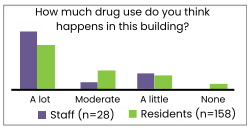Results from the 2024 WA State Permanent Supportive Housing Surveys of Residents and Staff
These reports describe findings from a survey of 28 staff members and 188 residents on their experiences and perceptions of substance use and staff approaches to substance use in their buildings.
Survey with Permanent Supportive Housing Staff

Perceptions of Substance Use in Permanent Supportive Housing: Results from the 2024 WA State PerCH Staff Survey (March 2025). This report describes findings from a survey of 28 staff members about their perceptions of substance use among residents and staff’s approaches to substance use in their buildings.
Survey with Permanent Supportive Housing Residents
The 2024 Washington State Permanent Supportive Housing Perceptions and Community Health (PerCH) Survey (Sept. 2024), led by ADAI’s Saul Petersky, explored experiences of people with histories of homelessness and a variety of drug use patterns, including abstinence, who are currently living in permanent supportive housing (PSH).
The survey documented demographics and characteristics of survey participants and explored their experiences with overdose, perceptions of substance use policies, quality of community relationships, personal substance use patterns and needs.
The planning and design of the survey began in October 2023 and involved input from 47 stakeholders with diverse perspectives (including people with current or former experiences of homelessness, current PSH residents, service providers, people who use drugs). The final survey was designed to capture a wide range of experiences of PSH residents, including those who did not use drugs or didn’t want to disclose their drug use.
Key Findings from the Resident Survey Report
- 188 residents in Permanent Supportive Housing (PSH) programs completed a survey on their perceptions of services for people who use drugs in their building and 115 of these residents also reported on their personal substance use and substance use treatment needs.
- 33% of participants had witnessed an opioid overdose in their building in the past 3 months.
- 79% of participants said they were “very likely” to ask staff for help when witnessing an overdose in the building and nearly half (49%) responded that they could access naloxone from front desk staff.
- 50% of participants felt there was “a lot” of drug use in their building; 34% agreed that staff openly discussed safer or reduced drug use with residents.
- Most participants said they have a friend in the building (74%) or in the community (63%) with whom they could spend time.
- Participants reported the “top needs in their life right now” as financial (21%), moving to different housing (17%), health care (13%), and employment (12%).
- 43% felt they are given opportunities to help make rules and programs that affect them.
- 58% of participants reported using drugs or alcohol in the last week, including cannabis. 14% were currently receiving methadone, buprenorphine, or naltrexone treatment medications.
- 80% of participants who reported past week opioid use (n=20) and 68% of participants who reported past week stimulant use (n=37) were interested in reducing or stopping their use of these drugs.
- 76% of participants who were asked about their interest in safe supply (n=37) said they would prefer a safe supply of opioids over the opioids or the medications for opioid use disorder they are currently using.
Additional Resources for PSH Providers
- Housing Program Staff Want More Training to Address Substance Use Among Residents. ADAI report (2021) by Alison Newman, MPH, and Susan Kingston.
- Permanent Supportive Housing Toolkit (Washington State Department of Commerce)
- Permanent Supportive Housing Fidelity Training Manual (Washington State Healthcare Authority)
- Applying Harm Reduction in Housing Settings (National Alliance of State & Territorial AIDS Directors)
- Supportive Housing Quality Toolkit (Corporation for Supportive Housing)
- Housing First Fidelity Scale (Pathways Housing First Institute)
- Evaluating Your Program: Permanent Supportive Housing (Substance Abuse and Mental Health Services Administration)
Acknowledgements: ADAI would like to thank the PSH residents who agreed to be surveyed and who assisted with pilot testing the survey. We thank the permanent supportive housing agencies and building staff for their collaboration in coordinating interviews with both staff and residents. We recognize the significant contribution of Tiffany Talley (Public Health-Seattle & King County) who assisted with survey administration and provided ongoing logistical support to this project. We would also like to thank Brianna Groesbeck, Charlotte McIntsoh, Allison Schwartz, Seth Warna and AB Winter (UW MSW students) who helped launch and administer the survey at our first partner site. We would also like to thank Kaela Moontree (Kitsap Public Health District), LeiLani Dawn (UW ADAI), Mary Meyer (Skagit Valley College), and Chan Plett, who helped administer the survey. We gratefully acknowledge Karin Ellis, June Capestany, Taurmini Fentress, Vivian James, Faeble Kievman, Dr. Moo-Hyun Kim, Alison Newman, Dena Salehipour, and Jackson Williams for their roles as key contributors on this project. We sincerely appreciate Christina Harris for their help with qualitative coding.

